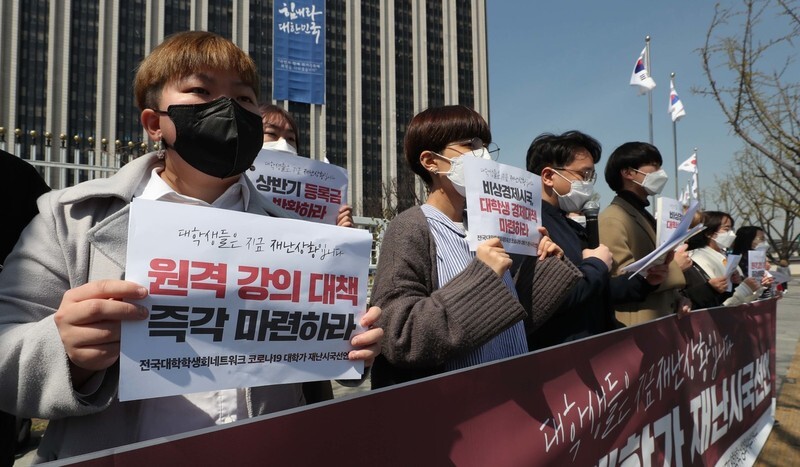hankyoreh
Links to other country sites 다른 나라 사이트 링크
University students submit Constitutional Court petition for tuition refunds as online classes continue

“We’re paying as much as 4.2 million won [US$3,425] a semester for tuition and not getting the services to match that, yet the education authorities and universities are playing dumb about the damage this is causing young people.”
On Apr. 24, Lee Da-hoon, a 25-year-old senior in new materials engineering at Inha University, submitted a Constitutional Court petition over the constitutionality of the failure to establish a legal basis for reducing tuition costs. Demands for tuition refunds have been growing as the novel coronavirus outbreak has resulted in online lectures continuing into the long term -- yet the Ministry of Education (MOE) and universities have each been placing responsibility on each other, arguing that there is no legal basis for tuition refunds. In response, Lee is requesting that the Constitutional Court review the matter.

“It is a legislative omission for Article 3 of the Rules on University Tuition [concerning tuition exemptions and reductions] not to include a regulation stating that tuition must be reduced in cases where universities fail to provide educational services at a level corresponding to the amount of tuition paid,” he argued.
On Apr. 27, Lee met with the Hankyoreh at the Inha University student union.
“During the first week of online classes, the server went down and [classes] couldn’t proceed normally,” he said. “Lecture quality has fallen substantially since then with things like the inability to communicate directly with professors.”
In the case of laboratory-based classes, there had been no announcements until a few days before, when students were notified that “theory-based classes will be beginning first online in early May.”
Current rules stipulate tuition refunds in cases of “natural disasters”; universities maintain COVID-19 is not natural disasterThe current Rules on University Tuition include provisions stating that tuition “may be waived or reduced in cases where tuition payment is deemed difficult as a result of natural disasters” or “may be waived for the semester or month in question when classes are suspended outside of the vacation period.” But educational authorities and universities have maintained that the coronavirus outbreak does not constitute a “natural disaster” and that individual universities have continued to conduct academic operations through their online classes.
In his Constitutional Court request, Lee took issue with the “violation of equal rights and property rights.” His claim is that it violates property rights for ordinary universities to charge full tuition for conducting classes exclusively online like cyber universities when the tuition costs are up to 10 times higher.
“Average annual tuition is around 750,000 won [US$611] for Korea National Open University and 2.7 million won [US$2,200] for Seoul Cyber University,” he explained. “The proper approach would be for the ordinary universities to reduce tuition to at least a third while they are providing classes exclusively online.” By his calculations, the losses associated with three weeks of exclusively online classes amount to around 560,000 won (US$456) from the 4.2 million won (US$3,425) he previously paid for tuition.
More than anything, Lee stressed that the “fundamental problem is how high the costs are to earn a degree.” His argument is that with the widespread focus on academic history and cliques in South Korea, universities are charging too much to provide “brand value” for employment purposes alone, without actually increasing the quality of their education.
Previously, the Korean Council for University Education suggested an alternative approach of universities paying “special scholarships” to students who are having financial difficulties. But Lee was critical of the “selfishness of universities regarding ‘special scholarships’ as an alternative -- like they’re doing students a favor -- at a time when most universities aren’t being transparent about the costs associated with online classes.”
With the Ministry of Education insisting that the tuition refund issue is “not a matter to respond to at the government level,” some universities have begun responding individually through special scholarship payments and other approaches. According to a survey by the Korea Association of Private University Presidents, 89 out of 193 universities nationwide had announced plans to begin holding in-person classes by May 11 -- but students’ complaints do not appear likely to go away any time soon.
By Choi Won-hyung, staff reporter
Please direct comments or questions to [english@hani.co.kr]

Editorial・opinion
![[Editorial] Yoon must halt procurement of SM-3 interceptor missiles [Editorial] Yoon must halt procurement of SM-3 interceptor missiles](https://flexible.img.hani.co.kr/flexible/normal/500/300/imgdb/child/2024/0501/17145495551605_1717145495195344.jpg) [Editorial] Yoon must halt procurement of SM-3 interceptor missiles
[Editorial] Yoon must halt procurement of SM-3 interceptor missiles![[Guest essay] Maybe Korea’s rapid population decline is an opportunity, not a crisis [Guest essay] Maybe Korea’s rapid population decline is an opportunity, not a crisis](https://flexible.img.hani.co.kr/flexible/normal/500/300/imgdb/original/2024/0430/9417144634983596.jpg) [Guest essay] Maybe Korea’s rapid population decline is an opportunity, not a crisis
[Guest essay] Maybe Korea’s rapid population decline is an opportunity, not a crisis- [Column] Can Yoon steer diplomacy with Russia, China back on track?
- [Column] Season 2 of special prosecutor probe may be coming to Korea soon
- [Column] Park Geun-hye déjà vu in Yoon Suk-yeol
- [Editorial] New weight of N. Korea’s nuclear threats makes dialogue all the more urgent
- [Guest essay] The real reason Korea’s new right wants to dub Rhee a founding father
- [Column] ‘Choson’: Is it time we start referring to N. Korea in its own terms?
- [Editorial] Japan’s rewriting of history with Korea has gone too far
- [Column] The president’s questionable capacity for dialogue
Most viewed articles
- 1Months and months of overdue wages are pushing migrant workers in Korea into debt
- 2Trump asks why US would defend Korea, hints at hiking Seoul’s defense cost burden
- 3[Guest essay] Maybe Korea’s rapid population decline is an opportunity, not a crisis
- 4[Editorial] Yoon must halt procurement of SM-3 interceptor missiles
- 51 in 3 S. Korean security experts support nuclear armament, CSIS finds
- 6At heart of West’s handwringing over Chinese ‘overcapacity,’ a battle to lead key future industries
- 7Fruitless Yoon-Lee summit inflames partisan tensions in Korea
- 8[Column] Can Yoon steer diplomacy with Russia, China back on track?
- 9South Korea officially an aged society just 17 years after becoming aging society
- 10Under conservative chief, Korea’s TRC brands teenage wartime massacre victims as traitors